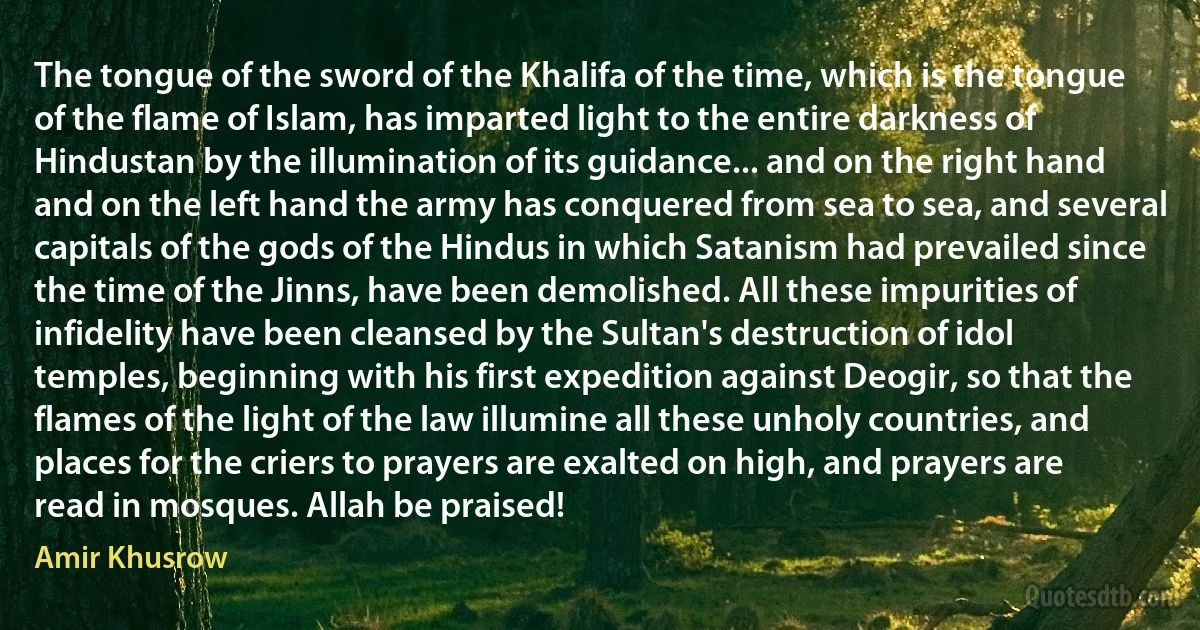
The tongue of the sword of the Khalifa of the time, which is the tongue of the flame of Islam, has imparted light to the entire darkness of Hindustan by the illumination of its guidance... and on the right hand and on the left hand the army has conquered from sea to sea, and several capitals of the gods of the Hindus in which Satanism had prevailed since the time of the Jinns, have been demolished. All these impurities of infidelity have been cleansed by the Sultan's destruction of idol temples, beginning with his first expedition against Deogir, so that the flames of the light of the law illumine all these unholy countries, and places for the criers to prayers are exalted on high, and prayers are read in mosques. Allah be praised!
Amir KhusrowRelated topics
allah army beginning darkness entire flame high islam law left light read right satanism sea sword time tongue gods Hindustan khalifaRelated quotes
When Hajjaj, the governor of Iraq, asked the Caliph for permission to send another expedition, the Caliph wrote back: "This affair will be a source of great anxiety and so we must put it off, for every time an army goes, [vast] numbers of Mussalmans are killed. So think no more of such a design.” But Hajjaj was a very tenacious imperialist. He spent the next four years in equipping an army more formidable than any which had so far been sent against Sindh. While sending off his nephew as well as son-in-law, Muhammad bin Qasim, with this army in AD 712, Hajjaj said: "I swear by Allah that I am determined to spend the whole wealth of Iraq, that is in my possession, on this expedition.”.

Muhammad bin Qasim
Ziyauddin Barani voiced his opinion against the Hanafi school when he wrote as follows in his Fatwa-i-Jahandari: "If Mahmud... had gone to India once more, he would have brought under his sword all the Brahmans of Hind who, in that vast land, are the cause of the continuance of the laws of infidelity and of the strength of idolators; he would have cut off the heads of two or three hundred thousand Hindu chiefs. He would not have returned his Hindu-slaughtering sword to its scabbard until the whole of Hind had accepted Islam. For Mahmud was a Shafiite, and according to Imam Shafii the decree for Hindus is Islam or death, that is to say, they should either be put to death or accept Islam. It is not lawful to accept jiziya from Hindus who have neither a prophet nor a revealed book.”.

Ziauddin Barani
Mahmud was a man of great abilities, and is renowned as one of the greatest champions of Islam.... His influence upon Islam soon became widely known, for he converted as many as a thousand idol-temples into mosques, subdued the cities of Hindustan, and vanquished the Rais of that country. He captured Jaipal, who was the greatest of them, kept him at Yazd (?), in Khurasan, and gave orders so that he was bought for eighty dirams. He led his armies to Nahrwala and Gujarat, carried off the idol (manat) from Somnat, and broke it into four parts. One part he deposited in the Jami Masjid of Ghazni, one he placed at the entrance of the royal palace, the third he sent to Mecca, and the fourth to Medina.

Mahmud of Ghazni
Answer me, sycophant, ought you not to have instructed me on one point at least, so essential to be known by a king; namely on the reciprocal duties between the sovereign and his subjects? Ought you not also to have foreseen that I might, at some future period, be compelled to contend with my brothers, sword in hand, for the crown, and for my very existence. Such, as you must well know, has been the fate of the children of almost every king of Hindustan. Did you ever instruct me in the art of war, how to besiege a town, or draw up an army in battle array? Happy for me that I consulted wiser heads than thine on these subjects! Go, withdraw to the village. Henceforth let no person know either who thou art, or what is become of thee.

Aurangzeb
When one is already happy it is important not to lose the virtues which have produced happiness. When they are successful, many men and women forget prudence, moderation, and kindness - qualities which were instrumental in their success. They are arrogant or thoughtless; an excessive self-confidence prevents them from accomplishing difficult tasks, and they soon become unworthy of their good fortune. They are surprised when their luck changes from good to bad. The ancient practice of sacrifice to the gods in return for happiness was a wise one. Polycrates, Tyrant of Samos, threw his precious ring into the sea as a sacrifice, and there are several ways of throwing the ring of Polycrates into the sea. The simplest is to be modest.

André Maurois
